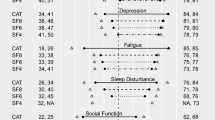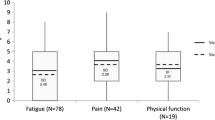Abstract
It is possible to accurately quantify constructs such as nausea, fatigue, and physical functioning using questionnaires referred to as patient-reported outcome measures (PROMs). Modern psychometric techniques ensure that PROMs can deliver exceptionally consistent and accurate measurement and allow for great flexibility in the way that the questions are administered. For example, modern techniques allow two people’s scores to be compared, even if they have answered a different set of questions taken from the full-length questionnaire. This underpins the process of computerized adaptive testing (CAT), in which a computer algorithm can iteratively select the most relevant questions for an individual, based on their previous responses. This chapter introduces modern psychometric theory and computerized adaptive testing and describes how these techniques are revolutionizing quality of life measurement in cancer.
Access this chapter
Tax calculation will be finalised at checkout
Purchases are for personal use only
Similar content being viewed by others
References
Meuser T, Pietruck C, Radbruch L, Stute P, Lehmann KA, Grond S. Symptoms during cancer pain treatment following WHO-guidelines: a longitudinal follow-up study of symptom prevalence, severity and etiology. Pain. 2001;93(3) https://doi.org/10.1016/S0304-3959(01)00324-4.
Basch E, Deal AM, Kris MG, et al. Symptom monitoring with patient-reported outcomes during routine cancer treatment: a randomized controlled trial. J Clin Oncol. Published online 2016. https://doi.org/10.1200/JCO.2015.63.0830.
Denis F, Lethrosne C, Pourel N, et al. Randomized trial comparing a web-mediated follow-up with routine surveillance in lung cancer patients. J Natl Cancer Inst. Published online 2017. https://doi.org/10.1093/jnci/djx029.
Gnanasakthy A, Barrett A, Evans E, D’Alessio D, Romano C De M. A review of patient-reported outcomes labeling for oncology drugs approved by the FDA and the EMA (2012–2016). Value Health. Published online 2019. https://doi.org/10.1016/j.jval.2018.09.2842.
Egleston BL, Miller SM, Meropol NJ. The impact of misclassification due to survey response fatigue on estimation and identifiability of treatment effects. Stat Med. 2011;30(30) https://doi.org/10.1002/sim.4377.
Weiss DJ, Vale CD. Adaptive testing. Appl Psychol. Published online 1987. https://doi.org/10.1111/j.1464-0597.1987.tb01190.x.
DeVellis RF. Classical test theory. Med Care. Published online. 2006; https://doi.org/10.1097/01.mlr.0000245426.10853.30.
Andrich D. Rating scales and Rasch measurement. Expert Rev Pharmacoecon Outcomes Res. Published online. 2011; https://doi.org/10.1586/erp.11.59.
Smith RM. A comparison of methods for determining dimensionality in Rasch measurement. Struct Equ Model Multidiscip J. 1996;3:1. https://doi.org/10.1080/10705519609540027.
Yong AG, Pearce S. A Beginner’s guide to factor analysis: focusing on exploratory factor analysis. Tutor Quant Method Psychol. Published online 2013. https://doi.org/10.20982/tqmp.09.2.p079.
Chou Y-T, Wang W-C. Checking dimensionality in item response models with principal component analysis on standardized residuals. Educ Psychol Meas. 2010;70(5) https://doi.org/10.1177/0013164410379322.
Mokken RJ. A theory and procedure of scale analysis: with applications in political research. Published 1971. https://books.google.co.uk/books?id=vAumIrkzYj8C&pg=PA23&lr=&source=gbs_toc_r&cad=4#v=onepage&q=mokken&f=false. Accessed 4 June 2020.
Zwick R, Donoghue JR, Grima A. Assessment of differential item functioning for performance tasks. J Educ Meas. 1993;30(3) https://doi.org/10.1111/j.1745-3984.1993.tb00425.x.
Christensen KB, Makransky G, Horton M. Critical values for Yen’s Q3 : identification of local dependence in the Rasch model using residual correlations. Appl Psychol Meas. 2017;41(3) https://doi.org/10.1177/0146621616677520.
Weiss DJ. Better data from better measurements using computerized adaptive testing. J Method Meas Soc Sci. Published online. 2011; https://doi.org/10.2458/v2i1.12351.
Gibbons C, Bower P, Lovell K, Valderas J, Skevington S. Electronic quality of life assessment using computer-adaptive testing. J Med Internet Res. Published online. 2016; https://doi.org/10.2196/jmir.6053.
Harrison C, Loe BS, Lis P, Sidey-Gibbons C. Maximizing the potential of patient-reported assessments by using the open-source concerto platform with computerized adaptive testing and machine learning. J Med Internet Res. 2020;22(10) https://doi.org/10.2196/20950.
Chalmers RP. Generating adaptive and non-adaptive test interfaces for multidimensional item response theory applications. J Stat Softw. Published online. 2016; https://doi.org/10.18637/jss.v071.i05.
Cella D, Yount S, Rothrock N, et al. The Patient-Reported Outcomes Measurement Information System (PROMIS). Med Care. 2007;45(5) https://doi.org/10.1097/01.mlr.0000258615.42478.55.
Kaasa S, Bjordal K, Aaronson N, et al. The EORTC Core Quality of Life questionnaire (QLQ-C30): validity and reliability when analysed with patients treated with palliative radiotherapy. Eur J Cancer. 1995;31(13–14) https://doi.org/10.1016/0959-8049(95)00296-0.
Young-Afat DA, Gibbons C, Klassen AF, Vickers AJ, Cano SJ, Pusic AL. Introducing BREAST-Q computerized adaptive testing: short and individualized patient-reported outcome assessment following reconstructive breast surgery. Plast Reconstr Surg. 2019; https://doi.org/10.1097/PRS.0000000000005314.
Author information
Authors and Affiliations
Corresponding author
Editor information
Editors and Affiliations
Rights and permissions
Copyright information
© 2022 Springer Nature Switzerland AG
About this chapter
Cite this chapter
Harrison, C.J., Sidey-Gibbons, C.J. (2022). Modern Psychometric Measurement and Computerized Adaptive Testing. In: Kassianos, A.P. (eds) Handbook of Quality of Life in Cancer. Springer, Cham. https://doi.org/10.1007/978-3-030-84702-9_9
Download citation
DOI: https://doi.org/10.1007/978-3-030-84702-9_9
Published:
Publisher Name: Springer, Cham
Print ISBN: 978-3-030-84701-2
Online ISBN: 978-3-030-84702-9
eBook Packages: MedicineMedicine (R0)




